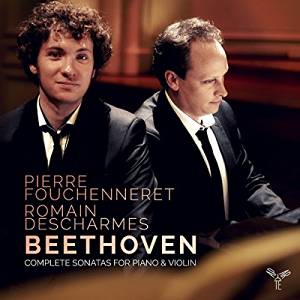BEETHOVEN Complete Violin Sonatas
View record and artist detailsRecord and Artist Details
Composer or Director: Ludwig van Beethoven
Genre:
Chamber
Label: Aparte
Magazine Review Date: 12/2016
Media Format: CD or Download
Media Runtime: 406
Mastering:
DDD
Catalogue Number: AP129

Tracks:
| Composition | Artist Credit |
|---|---|
| Sonata for Violin and Piano No. 1 |
Ludwig van Beethoven, Composer
Ludwig van Beethoven, Composer Pierre Fouchenneret, Violin Romain Descharmes, Piano |
| Sonata for Violin and Piano No. 2 |
Ludwig van Beethoven, Composer
Ludwig van Beethoven, Composer Pierre Fouchenneret, Violin Romain Descharmes, Piano |
| Sonata for Violin and Piano No. 3 |
Ludwig van Beethoven, Composer
Ludwig van Beethoven, Composer Pierre Fouchenneret, Violin Romain Descharmes, Piano |
| Sonata for Violin and Piano No. 4 |
Ludwig van Beethoven, Composer
Ludwig van Beethoven, Composer Pierre Fouchenneret, Violin Romain Descharmes, Piano |
| Sonata for Violin and Piano No. 5, 'Spring' |
Ludwig van Beethoven, Composer
Ludwig van Beethoven, Composer Pierre Fouchenneret, Violin Romain Descharmes, Piano |
| Sonata for Violin and Piano No. 6 |
Ludwig van Beethoven, Composer
Ludwig van Beethoven, Composer Pierre Fouchenneret, Violin Romain Descharmes, Piano |
| Sonata for Violin and Piano No. 7 |
Ludwig van Beethoven, Composer
Ludwig van Beethoven, Composer Pierre Fouchenneret, Violin Romain Descharmes, Piano |
| Sonata for Violin and Piano No. 8 |
Ludwig van Beethoven, Composer
Ludwig van Beethoven, Composer Pierre Fouchenneret, Violin Romain Descharmes, Piano |
| Sonata for Violin and Piano No. 9, 'Kreutzer' |
Ludwig van Beethoven, Composer
Ludwig van Beethoven, Composer Pierre Fouchenneret, Violin Romain Descharmes, Piano |
| Sonata for Violin and Piano No. 10 |
Ludwig van Beethoven, Composer
Ludwig van Beethoven, Composer Pierre Fouchenneret, Violin Romain Descharmes, Piano |
Author: Andrew Farach-Colton
The bigger and better surprise, though, is the unaffected, highly accomplished musicianship of Pierre Fouchenneret and Romain Descharmes, neither of whom I’d heard before. Fouchenneret’s tone is warm yet finely focused and with spot-on intonation throughout. Descharmes’s touch is unfailingly elegant; he renders even the thickest passages with crystalline clarity. Together, they are in total sympathy, phrasing with an affectionate attention to detail as well as a feeling for architecture. Start, for example, with the slow movement of the Spring Sonata, where both players use the copious ornamental figuration to highly expressive effect while maintaining the integrity of the melodic line. Or turn to the finale to hear how they invest each successive idea with such distinctive character yet make everything flow together with such ease.
My one reservation – and it’s a major one, I’m afraid – is that Fouchenneret and Descharmes too often disregard Beethoven’s instructions to play softly. Compare their reading of the finale of Op 12 No 3 with Faust and Melnikov’s, in which the opening tune is hushed with punchy sforzandos, as written; Fouchenneret and Descharmes are merely loud. Time and again, particularly in the early sonatas, this narrow dynamic range results in lost opportunities. Surely the Andante of Op 23 would have been considerably more playful and charming if it had been observed that nearly the entire movement is marked piano or pianissimo with only sporadic forte outbursts. (Again, Faust and Melnikov get this right.)
Happily, the later works display more satisfying dynamic exactitude. Fouchenneret and Descharmes’s effervescent way with Op 30 No 3 left me positively giddy with delight. The Kreutzer is also mightily impressive. Never mind that Variation 2 in the second movement feels slightly étude-like, their interpretation has a thrillingly firm dramatic grip, as well as unusual poise, even in the galloping impetuosity of the Presto finale. Op 96 is perhaps finer still. Listen to the development section of the first movement (beginning around 5'14"), where the players give the impression of feeling their way, awestruck, into uncharted emotional territory. The Adagio, too, is achingly intimate, and the finale encompasses a world in itself, one full of smiling spontaneity and song.
Faust and Melnikov remain my top choice for a modern recording of these sonatas, but Fouchenneret and Descharmes are absolutely worth a listen. I’ll certainly be returning to their superb accounts of the last three sonatas as well as the Spring, and I eagerly look forward to hearing more from them.
Discover the world's largest classical music catalogue with Presto Music.

Gramophone Digital Club
- Digital Edition
- Digital Archive
- Reviews Database
- Full website access
From £8.75 / month
Subscribe
Gramophone Full Club
- Print Edition
- Digital Edition
- Digital Archive
- Reviews Database
- Full website access
From £11.00 / month
Subscribe
If you are a library, university or other organisation that would be interested in an institutional subscription to Gramophone please click here for further information.




